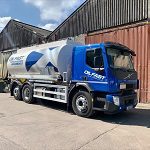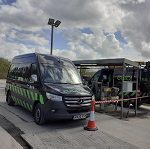
Scotland’s fastest-growing fuel distribution company, Oilfast, has announced an investment of over £700k in a further fleet expansion with the addition of five Volvo FE 6×2 Rigid Tankers.
Specialising in heating oil, red diesel, derv and licensed AdBlue and delivering to both domestic and commercial customers, the fleet additions are part of Oilfast’s commitment to expand and improve.
The company has a growing base in Wales with 8 depots across Scotland and Wales and the five new trucks will operate out of the company’s Crieff, Grangemouth & Insch Depots in Scotland.
William Nicol, transport & operations director commented: “We deliver excellent service to the UK, no matter the circumstance – even during COVID-19. That is why we are reinvesting back into the areas of the business that matter most to our customers.”
The Tanker build
The tankers are built by Cobo on a Volvo FE chassis with discharge and metering equipment from Emco Wheaton. After shipping the vehicle chassis to Emco Wheaton’s workshop in Margate, the specialist team attach the new metering equipment to the chassis for transport to Spain. On arrival in Spain, the team at Cobo install the chassis and tanker together – a process that can take serval weeks to perfect before returning to the UK.
Once the build is complete the tanker is returned to the UK for testing to ensure it is safe for transporting fuel. After passing this test it is then sent to be branded in the iconic Oilfast logo & saltire before being delivered to the Motherwell head office.
Key features
Each tanker has a gross vehicle weight (GVW) of 26 tonnes giving a maximum carrying capacity of 17,500 litres and are equipped with 5 compartments to allow for a wide range of products and services.
All vehicles come with 3 key safety features:
Overfill protection
Electrical isolation
Earthing & vapour recovery
What comes next?
Oilfast is quick to acknowledge the part their customers have played in putting them in the position to expand the fleet as William explains: “As we grow as a company, so does our customer base and we want to ensure that we do right by all our customers. As such, the technology may change but our approach to customer service will not. We do not have call centres; we will always have community focused depots that offer a localised approach to providing our services. As such, we are still committed to providing the best service possible.”
And, looking ahead, William concludes: “Our vehicle investment for 2021 is now over £1million. With a further 8 tankers coming in 2022 this takes our total investment in vehicles to over £2.5million in two years. As we grow, it’s important we reinvest back into the areas that got us here in the first place. We are extremely excited to see the next generation of Oilfast tankers out on the road and hopefully, our customers are too.”

In a significant expansion of its future fuels capabilities, marine energy specialist KPI OceanConnect has announced the launch of its Alternative Fuels and Special Projects division led by Bill Wakeling, an expert in marine fuels. As pressure intensifies for the shipping industry to become more sustainable, the new division will capitalise on its experience and expertise to enable its clients to achieve net-zero emissions from their marine fuels.
Bill Wakeling will head up this new division of KPI OceanConnect, a leading global broker and trader in marine fuels for more than 50 years and will lead on all matters relating to alternative fuels and decarbonisation, as well as exploring opportunities for new ventures and projects. With his rich experience in marine fuels, Bill is well-positioned to lead this new function, and drive measurable environmental and sustainability change throughout the marine fuel supply chain.
Speaking on his appointment, Bill commented: “I’m honoured to lead KPI OceanConnect’s alternative fuels and sustainability operations at a time where the industry must accelerate its decarbonisation progress in line with the International Maritime Organization’s 2030 and 2050 targets.
“In the last 18 months, we’ve helped our partners successfully navigate through IMO 2020, and showcased our agility and innovation by completing one of the shipping industry’s first carbon offsets. However, there is no shortage of challenges for shipowners and operators as they seek to realise a more sustainable future, and we’ll be working with them side by side through our long-term partnership approach to help achieve their sustainability ambitions and regulatory compliance.”
Commenting on the announcement, KPI OceanConnect’s CEO, Søren Høll, said: “This new function signifies our commitment to advancing decarbonisation in the maritime industry, and Bill Wakeling is the ideal person to head it up; there are few people with his track record, marine fuels expertise, and commercial awareness.
Our clients have a growing and sustained need for innovative solutions that can enable them to fulfil their green objectives, and they’re going to be in very safe hands with Bill and his team.”

January 2020 saw a new limit on the sulphur content in the fuel oil used on board ships come into force, marking a significant milestone to improve air quality, preserve the environment and protect human health. Known as ‘IMO 2020’, the rule limits the sulphur in the fuel oil used on board ships operating outside designated emission control areas to 0.50% m/m (mass by mass) – a significant reduction from the previous limit of 3.5%.
The implementation of IMO 2020 represented the most dramatic change to ships’ propulsion since the end of coal bunkers, and the beginning of a transition to decarbonisation that will alter the marine fuels market, as we currently know it, beyond recognition. In conjunction with the logistical challenges of Covid-19, as well as the impact of the OPEC+ oil price, this has made fuel compatibility and quality as well as finance a more prominent issue for shipowners.
Given the impacts of the virus, lockdown, oil prices and environmental imperatives on the whole fuel market and the implications for strategic planning and buying relationships we speak with Brian Coyne, managing director of KPI OceanConnect, one of the most experienced independent marine energy service providers, to consider the very specific issues related to marine fuels in the light of IMO 2020 regulatory obligations as well as how owners and operators can deliver cost-effective marine energy procurement strategies in this new, complex market environment
Brian explains: “IMO 2020 presented numerous new challenges for shipowners to consider before purchasing bunkers. Concerns about compliance, compatibility, and availability of fuels dominated but they were far from the only challenges the industry faced.
A need for trusted partners
One of the biggest ones was the interlinked demands of credit and creditworthiness. This stressed some industry balance sheets after years of volatile freight rates, and the higher cost of IMO 2020 compliant fuels made it much more difficult for smaller firms to keep doing the same level of business with their existing credit lines. When Covid-19 arrived, risks across the supply chain increased and created headwinds for many maritime businesses. We saw some companies who did not have adequate risk management in place go into insolvency. Although, the pandemic suppressed demand and subsequently prices, the market is rising again as vaccines are rolled out and demand returns to pre-pandemic levels.
At a structural level, the shipping industry has also seen a decline in capital availability for all but the strongest players. This is due to many large banks, such as ABN AMRO, Rabobank, and BNP Paribas, pulling out of commodity trade financing. This has created additional costs, liquidity and transaction complexities for shipowners and bunkering companies. Forensic due diligence has become far more common and a perception of lenient corporate governance in some corners of the shipping industry further inhibited banks from lending to the sector.
Fundamentally, this new dynamic highlights the need for trusted partners, acting transparently and collaboratively with customers and stakeholders across the industry to implement robust risk management strategies. As a result, tightening lending criteria are locking some firms out of the market and creating daily liquidity struggles for others. The bigger, better run players’ ability to meet these rising standards through robust and stable capital reserves and advanced risk management tools has been readily apparent.
Regional Disparities
Elsewhere, the compound effects of Covid-19 and IMO 2020 had different impacts on the marine fuels market. For bunkering hubs in some oil export regions, such as Fujairah, the decline in the number of tankers arriving to load crude cargoes has had a noticeable impact on total sales. Whereas in Singapore and Rotterdam, total volumes were up considerably year-on-year.
In major markets there has – for the most part – been plenty of IMO 2020 compliant fuels. However, in smaller markets and some regional niches it remains a complex challenge to procure compliant product. When I spoke to clients last year, the feedback was almost always the same: suppliers without a resilient global network and staff with local expertise are finding it difficult to consistently source the bunkers their clients needed.
With a continuation of oil price volatility and a price trending upwards, we also expect increasing bunker prices. In previous years when the price per barrel of WTI/Brent has risen, there have been reports of unscrupulous suppliers or feedstock providers using cheaper blending components. Unfortunately, our experience suggests that the impact of these changes are often detrimental to vessel operations.
Looking to the future
The environmental benefits of IMO 2020 are apparent. There has been a 70% reduction in sulfur oxide emissions thanks to the global sulfur cap with compliance levels strong. IMO also has an action plan for further air quality improvements.
Moving forward, we expect to see more consolidation across the sector as the transition towards future fuels and alternative sources grows. Consolidation, such as our merger of KPI Bridge Oil and OceanConnect Marine to form KPI OceanConnect, demonstrates that we are at the front, driving the change needed in our industry.
Partnering with an organisation that delivers advanced marine energy solutions on a global scale, by leveraging enhanced synergies and adopting a consultative approach, adds value for shipowners, operators, and charterers. Today, we are in a strong position and fully prepared for the rebounding bunker volumes, which are gradually starting to increase in line with the Covid-19 vaccination rollout.
The marine energy supply chain will transform immensely in the years to come, and there will be challenges ahead for the entire bunkering sector, as old, purely transactional processes are replaced with comprehensive consulting services. Implementing a comprehensive bunker procurement strategy to manage risks is crucial as we continue to endure price volatility in the immediate, if not long term.
KPI OceanConnect is well positioned in the value chain to help the industry manage this new dynamic through its partnership approach, offering reliable and trusted expertise and real time market intelligence.

Having recently been promoted to the role of inland sales manager at Mabanaft Clare Charlton is enjoying the challenge and responsibility and is also looking forward to working with the management team as the company develops its supply of more sustainable fuels.
Maintaining high levels of service
Clare joined Mabanaft in 2019 as a key account manager and has risen rapidly to take on this new role. The inland sales department is responsible for selling fuel to a diverse range of customers, from resellers, distributors and commercial/end users to bunkering network users and supermarkets. Clare will be working with her team to ensure that all customers’ needs are met and that the high levels of service that the company is renowned for are diligently maintained.
Building lasting relationships
Clare said: “I am enjoying the challenge and responsibility of my new role at Mabanaft. I love the company ethos of building strong and lasting relationships with customers, it’s something everyone here buys into. I also really like the people, there’s a good team spirit and plenty of positive collaboration which makes for a great working environment.”
Supporting customers through changing times
“The last 18 months have been dominated by the global pandemic. People still needed fuel and I am proud of how my team managed to support customers and deliver excellent service throughout. Our industry is undergoing massive change and I am looking forward to working with the management team to seek new opportunities to support the transition to new and more sustainable fuels.”
More

To consider the future of the fuel oil industry, we need to contemplate its past. From a ‘dirty oil’ image to one displaying adaptation, growth and evolution, the changing face of the fuel industry is one that’s been witnessed within our own pages more so now than ever before. Steering a business towards growth and opportunity in a rapidly changing industry is not for the faint hearted, and here, we speak with distributors currently at the helm to see how they are safeguarding the future of their businesses with succession planning, and the challenges this brings.
Playing a key role in the hiring process at Harlow-based New Era Fuels, we hear from HR manager, Vicky Finch who tells us about her own entrance into the company: “I entered the business having eight years’ experience working within human resources and recruitment. I met with the finance director who presented me with New Era Fuels core values, which attracted me to the position. New Era Fuels was undergoing a growth phase and required a full-time human resources manager. I felt very excited to be part of the New Era Fuels family; I was especially attracted to the company culture, core values and the growth plans for the future.”
Telling us more about the company’s growth plans for the future and how the first port of call is looking within the company, Vicky comments: “As a business, we understand succession planning can be to identify business-critical roles for which potential successors are needed. New Era Fuels are always looking out for our ‘shining stars within the business.”
New Era Fuels is not against bringing new talent into the business however, as Vicky explains: “We are pro-apprentices! We recruit for apprenticeships across the business and have the view that employing apprentices is a fantastic way to upskill, train and develop employees.
“Our apprentices make contributions to the workforce whilst they are learning – gaining skills on the job. We typically appoint a ‘mentor’ who will be the line manager of the apprentice. The mentor will help our apprentices develop their approach to work, including building rapport, teamwork, integrity and remaining positive and professional. They will also teach the apprentices about company procedures, culture and the ways of working.
“Hiring an apprentice is a cost-effective way of recruiting and training our employees too.”
A family affair
One of the most charming aspects of the industry is the number of businesses still owned and operated by families. With new generations taking the reins from their parents, it seems that many in the sector have ready-made succession plans. David Prince, owner of Melton Mowbray-based Prince Petroleum tells us more about his own family’s history with fuel distribution:
“Prince Petroleum was started by my late father Victor Prince in 1963, at this time they were known as “Hawkers” for Esso blue paraffin, I recall as a child going out on paraffin delivery rounds with my father in, what was already an old, ex MOD fuel Tanker.
“By the mid to late sixties the business was appointed an authorised distributor for the then continental oil company (CONOCO) at this time the business had expanded into road fuels, home heating oil and agricultural fuels.
“Today Prince Petroleum is owned by David and Rita Prince. The business continues to grow and recently my two sons have joined the business.”
We also spoke with Tom Davies of Hampshire-based Rawlings Fuels about the issue of succession for an independent distributor but with three generations of the Rawlings family still active in the company, Tom sees no reason why the business shouldn’t continue operating independently for many years to come.
Terry Rawlings was the owner of Rawlings Fuels when Tom got involved, as he explains: “I was originally a planner at Cemex in the construction industry and then came into oil distribution to work for Terry.” Terry is still involved with the business but has passed it down to his son, Paul Rawlings. It is still very much a family business with Terry’s daughter and grandson also working for the company.
Sam, Terry’s grandson is currently the O-license holder for Rawlings Fuels and so the company is safe in the hands of three generations of the family with everyone focussed on the company vision of looking after its customers in the very close-knit communities Rawlings Fuels delivers to.
Finding the right person
For some, having a succession plan is only half of the challenge.
Having gone straight from school into Ultramar Golden Eagle and the family-owned fuel distribution business, Mark Nolan is someone who clearly sees the challenge that succession planning presents to the independent distributor: “My grandfather was the first distributor in the family supplying coal and wood to the local community. Then my dad came on board and set up selling petrol for Regent from fuel pumps at the front of the farm and then onto selling blue paraffin bought from Vine Fuels who then wanted a distributor for kerosene between Bicester and Aylesbury.
“This was how fuel oil distribution first became the family business and my mother and father set up Markim Fuels as a distributor for Ultramar which I became a director of and then Q8 bought out Ultramar so I set up independently as Nolan Oils in 1988. In truth I believe I now work twice as hard for a 3rd the profit my parents enjoyed, so they used to tell me!
“I’d love to expand but it’s a challenge to find the right person to run a third depot with the industry not as attractive to come into as it once was. I can understand why others I know have sold up. Some have no-one to hand it down to, others see buying groups constantly eroding the profit margins and many youngsters perceive it as smelly and dirty industry which reduces new talent coming into it.”
“It’s a shame because I still love the business as do my staff. I look after them and they look after the customers and, at the end of the day, that brings a lot of satisfaction.”
Do you have a succession plan for your company? Have you thought about selling, or buying in the future? We’d love to hear from you.

Carrie Marsh, managing director of Marsh Fuels and Master Elect of the Worshipful Company of Fuellers, has won a Lord Mayor of London Covid-19 award for services within the Livery.
Carrie met with the Lord Mayor of London on 19th July, where she was presented with the award, as well as a wonderfully aromatic mint tea grown in the UK and Mansion House bone china mug.
This special edition of awards in light of Covid-19, usually held annually by the Lord Mayor in London for business, recognised the unsung community heroes helping others through the pandemic. From hundreds of nominations spanning the length and breadth of the city, 13 winners were chosen in three categories: crisis response, delivering differently and community champions, plus the Mayor of London Young Londoners Awards.
A worthy winner, during the last 15 months Senior Warden Carrie Marsh, has been writing a weekly blog to lift members’ spirits, especially for those not online, designed for the initial 12 weeks of lockdown and then extended until all members could meet again in person. Telling us more about the upcoming meeting, Carrie said: “The date for that has finally been set for 26th August this year, with the last – and 70th blog – to be sent on the 25th August!”
As well as boosting morale, Carrie also made face masks for the membership and donated the proceeds of these to the Fuellers Charitable Trust Fund. Not stopping at making masks, Carrie said: “The Trust

Having recently reported the concerns of industry trade bodies Logistics UK and the CBA regarding driver shortages (here) and the potential impacts on supply chains (here) it is reported that the issue has contributed to the temporary closure of several petrol stations after running out of fuel due to lack of deliveries.
Last week a busy BP service station on the A140 in North Norfolk was temporarily closed and there are also reports of sites in Reading and Berkshire having to close for a period leaving drivers faced with empty petrol pumps.
BP bosses have admitted its petrol stations have been affected by the driver shortage, meaning some of its pumps are empty, but explained that the issue is not due to a fuel shortage. Fuel companies are being hit by driver shortages which are impacting supplies. The shortage of HGV drivers is an already chronic problem in the industry but is being further exacerbated by some drivers being forced to self-isolate after being pinged by NHS Test and Trace.
The Test and Trace issue also necessitated a temporary closure of the BP fuel distribution terminal at Hemel Hempstead with the spokesperson confirming: “We are experiencing fuel availability issues at some of our retail sites in the UK. Our supply chain has been impacted by the industry-wide driver shortages across the UK, exacerbated by a temporary closure of our Hemel Hempstead fuel distribution terminal last week because of necessary Covid-19 isolations among staff impacting our supply chain. Our Hemel terminal is now operating as normal.
“We are working hard with our haulier supplier to deliver fuel into sites and minimise any disruption to our customers. We apologise for any inconvenience caused.”
Another industry body has responded to the announced Government actions to mitigate the chronic shortage of HGV drivers in the UK, with the Chemical Business Association (CBA) welcoming aspects of the response but also emphasising that ‘more still needs to be done’.
In an open letter to the logistics sector, the Secretaries of State for Transport, Work and Pensions, and the Environment announced a package of initiatives, including:

Europump Maintenance (EPM) has received a glowing health and safety review from Hanson Cement for work carried out at the client’s Ribblesdale site. With the account being a relatively new one for EPM, the team had to go on site to do a PPM (planned preventative maintenance) check. At the same time, a Europump engineer was on site to do a line test. During the visit, Hanson’s team carried out a spot check on EPM’s work.
Europump service engineer, Graham McAlister, said: “Ribblesdale is a big cement plant with a fuel island on site. While undertaking our work we had to ensure that we were protecting ourselves and the working area. Someone from Hanson came out on site with a clipboard to do a spot check and scored us for health and safety measures. They said they were absolutely over the moon with what we were doing and awarded us a gold star, which is their highest rating!”
Steven Bamford, workshop co-ordinator at Hanson UK’s Ribblesdale works, said: “We were very impressed with the Europump engineers, especially with how professional and organised they were with regards to isolating the area and making the work area safe for themselves and others.”
McAlister added: “It’s lovely to get feedback like this but what Hanson thought was impressive was actually normal for us!”
A bill aimed at maintaining fuel supply to customers in the event of disruption has been published. The draft Downstream Oil Resilience Bill, which was introduced last month by energy minister Anne-Marie Trevelyan, sets out how the Government intends to address threats to the security of fuel supply by providing powers to ensure resilience in the downstream oil sector, including companies involved in the refining, importing distribution and marketing of oil products.
Most Read











